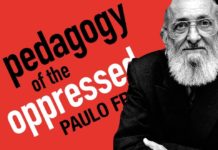Disclaimer: The Eqbal Ahmad Centre for Public Education (EACPE) encourages critical and independent thinking and believes in a free expression of one’s opinion. However, the views expressed in contributed articles are solely those of their respective authors and do not necessarily reflect the position or policy of the EACPE.
Looking at nature in the past was quite different. Newton and Leibnitz thought universe as a great puzzle and they thought they were puzzling out the questions of nature. They thought it is God sending messages to people and they were selected people of God whom God gave messages. Newton could not explain orbits of some planets which later Einstein did and there he invoked supernaturalism. He said we cannot know this phenomenon and it’s God who controls this particular phenomenon. Newton even thought that universe was regular and that symmetry was evidence of something. But Nobel Prize winning American Theoretical physicist Steven Weinberg says we don’t do that anymore. We can understand nature without giving rise to supernaturalism. We even know the symmetry lies just in the eyes of observer. When we go closer and closer to beginning of universe it seems quite irregular to predict things. The one evidence of irregularity in the universe is that there are millions and millions of planet but life is possible on only few or on just one. But we can fight irregularity by inventing new tools of reasoning. It is quality of mathematicians that they always invent new type of tools to look at universe. These are we who raise questions and it is our understanding of nature of logic and reason that we can raise sensible and answerable questions. Even Weinberg says that now a graduate student of physics understands relativity much better and deeper than Einstein did. But hold on, credit still goes to Einstein because he was the pioneer of the idea. He was first to ask this very question of phenomena being governed by relativity. But science continues to evolve to ask new questions and to solve mysteries which are unknown to mind unless uncovered by science.
There is no refutation to science and even if there is one it will surely come from science itself using scientific method, not from outside. So if we are sceptical to something, we should consult our reasoning in order to refute it or accept it rather than taking sides based on dogma. There are still many unresolved mysteries in science and it is a continuous struggle. To do science, you need a fervour and enthusiasm because mostly your attempts end up in smoke. For instance, you sit on a good day to make theory of a phenomenon or to solve a mathematical theorem. After a thought process of many hours, you come to know that you were looking even at wrong side of the problem. But as David Roos says all scientists are ambitious because pessimists leave the field., those who are working in it are ambitious and these are their ambitions coming true that we enjoy many facilities of science.
When we learn things, we associate meanings to things and try to connect our ideas. We follow just one simple rule that there must not be any contrast between things we say. We have to make our reasoning rigorous and refined. There are certain natural phenomenon occurring irrespective of existence of a human brain observing them but it is an observer who associates meanings to that phenomenon.
If you look at the Islamic Golden Age, the only difference was that of culture and mode of thinking.
To do science a necessary but not sufficient condition is that we need a scientific environment. It is the scientific thought that matters much more than money and resources. If you look at countries including Pakistan, they have plenty of resources but there is no science at all. Sadly, it is because there is no scientific brain there. Science goes within cultures and it is a culture of thinking differently and logically that gives rise to ideas. You don’t choose to think most of the times rather thoughts come arbitrarily when you have that thinking process. Nobel Laureate Professor Abdus Salam once said that science is like intoxicity for good scientists, when they start doing it they continue to do it. As poets do, they write some verses of poetry and then continue to write poetry their entire life.
To look at this cultural negligence of science in Pakistan, let me give you a most recent example. 21st November marked the death anniversary of one of a few great theoretical physicists of 20th century, Dr. Abdus Salam. It passed unmentioned in much of our media. Even on the social media, there were only a few mentions. After two days of his death anniversary was the death anniversary of martyred Pakistani female fighter pilot Maryam Mukhtiar. Hundreds of people mentioned her in their posts and admired her. No doubt she is hero of our country and deserves our admiration, but look at the difference that we preferred to ignore a man of international repute. This tells us something about our collective thought trends. Our students give importance to poets and actors more than scientists. We value army officers, players and actors more than academics.
Abdus Salam never wished to be praised by us but it is in our own benefit to recognize his efforts. Developing the culture of valuing academics will raise interest for science in our next generations. And they will start considering scientists and intellectuals equally important as players and army officers. In present, situation is not so bright. For instance, if we look at the books publishing in Urdu, most of them seek to glamorize and glorify our past conquests and the bygone empires. Ironically, we just memorise that Muslims had a Golden period without knowing much about those people. We need to know how Muslims of golden age were different than ourselves. It seems we have divided this world in binaries. We think every good idea has come from Muslim origin and every evil has come from outside. We have over valued Iqbal, calling him a philosopher besides being a poet. We say this without knowing that philosophy is all about rationality or preference of logic over belief, and poetry is all about emotions and exaggeration. Two are exactly opposite to one another. We keep celebrating Iqbal, which is all fine, but in school Abdus Salam is almost not mentioned. So we have that selective culture of valuing certain things and rejecting all what disagrees with our preferred ideology. This trend is dangerous and it is responsible for utter darkness that is prevailing in science in the Muslim world. If you look at the Islamic Golden Age, the only difference was that of culture and mode of thinking. They valued ideas much more than other things and they were receptive to all ideas whether they came from person of any background. Now, unfortunately we decide what’s right and what’s wrong based on our personal prejudice.
Therefore, we have to grow the culture of valuing academics and respecting scientists of any background. We have to tell our students about importance of science and scientific method. We have to share human side of scientists to students. The important thing is science evolves and we change our perspectives, and this explains how Steven Weinberg looks at the same universe in a quite different manner than that of Newton.
About the Author:
The writer is doing F.Sc (Pre-Engineering). He has a deep enthusiasm for physics and mathematics. He is also a member of Science Talent Farming Scheme (STFS) of Pakistan science foundation (PSF).







